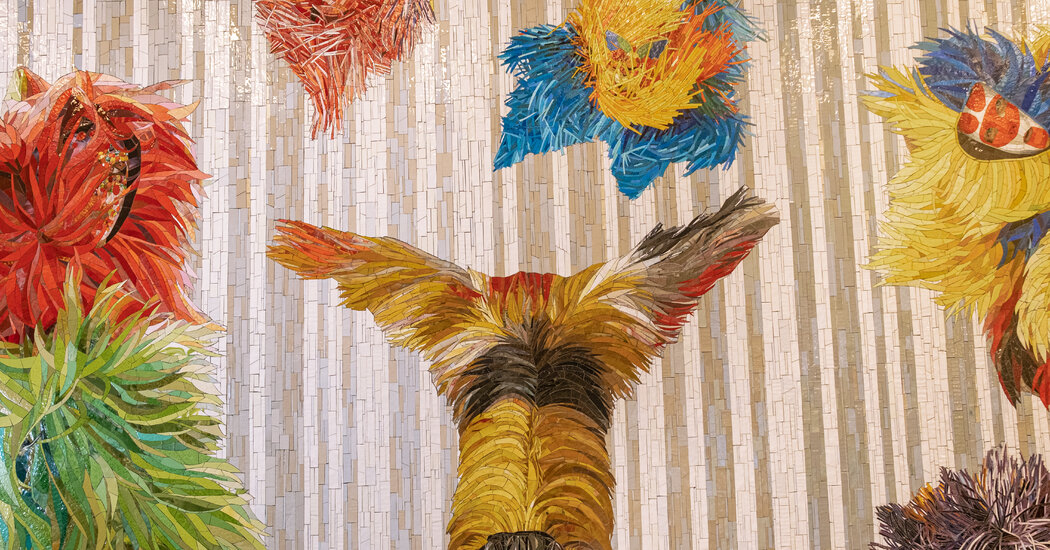
For an artist best known for “Soundsuits” that produce a variety of percussive effects when worn, Nick Cave’s public project, “Each One, Every One, Equal All,” has found a fittingly noisy home in the New York subway.
Earlier this month, during a preview of the completed project, a saxophone reverberated through the tunnels of the Times Square and 42 Street subway station, its sound almost overcome by the surging clatter and roar of trains. Here the artist’s wearable works, which fuse dance to sculpture, have been dramatically rendered into mosaic tiles across nearly 4,600 square feet, throughout three neighboring underground sites — the first phase was finished last year — making this the largest such project completed to date in the New York City Transit system.
I’ll admit I was initially skeptical how Cave’s wearable sculptures could effectively translate into mosaic glass. I once heard Cave tick off the inspirations for a suit by saying he was thinking of the shapes of a mitre (as a Bishop might wear), a condom, and a klansman’s robe — disparate sources that suggest devotion and power, sex and care, hatred and terror. He has a knack for combining the quirky and the mundane, the painful and ugly, and rendering something joyful and beautiful on the other side.
Cave’s Soundsuits share the strangely relatable, friendly-monster energy of Jim Henson’s Muppets, if the puppets had been influenced by the traditions of African dance, ball culture, and New Orleans carnival. The variety of their textures and materials account for much of their power — from airy faux fur in a rainbow of colors to coats of thwacking porcupine-esque brown twigs. This range of plumage and their shifting visual and aural characteristics are partly why the Soundsuits remain interesting after 30 years and several hundreds of examples later. In the subway project, fur, sticks, hair extensions, sequins, buttons, embroidery, festive masks, and even birds and flowers are marvelously and convincingly realized through the glasswork fabricated by Franz Mayer of Munich.
This marks a big moment for Nick Cave’s three-dimensional work to appear in two-dimensional urban public space. The unveiling at the Times Square-42nd Street station debuts nearly concurrently with a major presentation of Cave’s work in his Chicago hometown. Video of a choreographed performance of his Soundsuits will illuminate the 2.5-acre facade of the building formerly known as the Merchandise Mart (now known as “the MART”), which sits prominently across the Chicago river from the downtown loop. Also on May 14, the Museum of Contemporary Art, Chicago, opened “Nick Cave: Forothermore,” his first career retrospective.
In New York, it’s best to begin the underground show with “Every One,” the largest and first completed phase of the project, which opened in September 2021. Enter at the 42nd Street—Bryant Park/Fifth Avenue Station and travel to the B, D, F and M train platforms deep within to reach the new pedestrian tunnel to the Shuttle at Times Square. As you move up the stairway to the connector, Cave’s figures come into view before and above you.
A clever trick of perspective collapses the space between the walkway and Cave’s procession on the wall to the right. While most figures are rendered at human scale, a few of the more than two dozen are enlarged, so that they seem to invade your space, as if you are brushing up against a fellow commuter in your peripheral vision. In one extreme example, a fragment of a torso, just below outstretched arms, stretches across some 20 feet. Midway through the corridor, the procession is interrupted by a set of screens that every quarter-hour plays a 3-minute video work showing the movements of dancers wearing the tiled Soundsuits on adjacent walls.
I used to work in Midtown and frequently took the Shuttle, but haven’t been back in years. The platform was unrecognizable to me, a vast improvement, with art where previously I only recall I-beams of corroded steel. Moving toward the exit under One Times Square, “Equal All” presents a regiment of figures standing in ordered bays, composing a life-size catalog of some of Cave’s most notable sculptures translated into tilework, like a feathered fur bullseye-face atop a body covered entirely with ivory-colored buttons with red thread.
Two take the form of worn mobiles: in the first, the legs and torso act as the trunk of a tree and a headdress envelops the rest in a set of branches within which an aviary of porcelain birds have perched. In the second, the branching headdress holds a collection of old-fashioned toy metal spinning tops and noisemakers. Elsewhere one figure looks like a humanoid bouquet of flowers. Another wears a suit fully composed of brown sticks, the head obscured from within a dark hole that looks like a periscope fashioned from a tree trunk. All of it in tile.
Across the way and near the exit out toward the skyscrapers and flashing lights at One Times Square, “Each One,” picks up the horizontal motion of “Every One,” shifting it vertically in an explosion of kinetic energy. The M.T.A. claims the 14.5-foot-tall mosaic mural refers to the New Year’s ball drop immediately above — but more practically “Each One” prepares an exiting rider for the sensory overload that awaits every other day of the year.
The Soundsuits seem to be in motion, creating visual vortexes, variously spinning and rising or falling, conveying differing weights and textures of the figures’ pelts and exaggerating the movements of the wearer. Even in facsimile tile, they feel more alive than when I’ve seen the actual sculptures presented on mannequins in the near-silence of museums and galleries.
How do they measure up to the many artworks in the New York subway system? Near Cave’s sprawling project you can find Roy Lichtenstein’s “Times Square Mural,” depicting a comic-strip futurist subway car in Dick Tracy yellow, in a geometric tunnel that nods to Piet Mondrian. In porcelain enamel, installed in 2002, it feels like a bit of the Museum of Modern Art on loan to the M.T.A. It’s big compared to a painting, though in the context of a station it gets lost. Cave’s project is much more effective at making its presence known.
His joyous figures contrast with “The Revelers,” a diffuse 2008 mosaic by Jane Dickson along the subterranean path from the Port Authority to Times Square Station. Her figures, both generic and idealized like characters out of a Norman Rockwell painting, wear hats and hold horns also nodding to New Year’s festivities. But they don’t look much like subway riders and their celebration seems stuck in another time. Cave’s friendly monsters have an otherworldliness: there’s a natural kinship with the underground throng in their ostentatious fashion and flâneur-like anonymity. “Each One, Every One, Equal All” feels like a necessary correction, right at home amid the noise and teem.
Each One, Every One, Equal All: Nick Cave Permanent Installation
Spanning Times Square-42nd Street and Bryant Park Stations, and the 42nd Street Shuttle connector.




